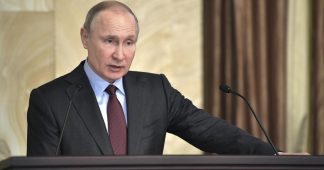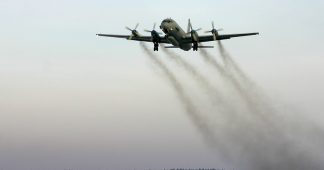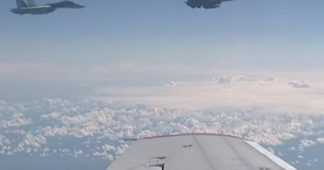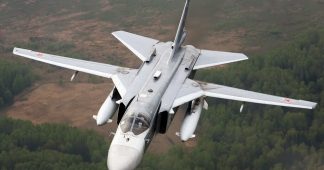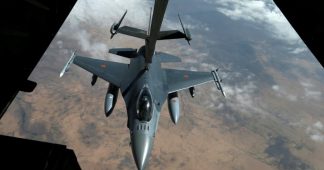By Bill Van Auken
19 September 2018
Tensions remain high in Syria after the downing of a Russian Il-20 electronic intelligence plane and the killing of all 15 crew members aboard during a major Israeli airstrike against the Syrian port city of Latakia Monday night.
The attack on Latakia, a government stronghold and the site of Russia’s major military base in the country, represented a dangerous escalation of the war in Syria, which the Israelis almost certainly carried out in consultation with Washington.
Tel Aviv claimed that its strike was motivated by intelligence that weapons located there were being transferred from Iran to the Lebanese Shia movement Hezbollah. A more powerful underlying motive, however, is the frustration of US imperialism and its allies, Israel and the NATO powers, over the increasing consolidation of control over Syria by the Russian-backed government of President Bashar al-Assad and the failure of the Al Qaeda-linked militias that they backed in a proxy war for regime change.
The Russian Ministry of Defense Tuesday acknowledged that its plane had been hit by Syrian anti-aircraft fire, but placed blame for the incident squarely on what it termed a “provocation” and “hostile” act on the part of Israel.
The Russian turboprop plane was returning to the Russian-run Hmeymim airbase, when it went off the radar screens in the midst of an attack by four Israeli F-16 fighter jets against Syrian defense industry facilities in Latakia.
“The Israeli pilots were using the Russian aircraft as a shield and pushed it into the line of fire of the Syrian defense,” Igor Konashenkov, the Russian defense ministry spokesperson, said on Tuesday.
Russia’s Interfax news agency quoted Konashenkov as describing Israel’s military strike as “hostile” and “an act of provocation,” warning, “We reserve the right to take commensurate measures in response.”
This response was echoed by Russian Defense Minister Sergey Shoigu, who declared that the “blame for the downing of the Russian plane and the deaths of its crew members lies squarely on the Israeli side.” He added, “The actions of the Israeli military were not in keeping with the spirit of the Russian-Israeli partnership, so we reserve the right to respond.”
Later the same day, Russian President Vladimir Putin demonstratively backed away from this sharp response and implicit threat of military retaliation.
Speaking in Moscow at a joint press conference with Hungarian Prime Minister Viktor Orban, Putin drew a distinction between Latakia and the 2015 incident in which a Turkish warplane had shot down a Russian S24 jet, after which Moscow imposed severe sanctions against Ankara.
The Turkish military, he said, had “deliberately downed” the Russian plane, while the Latakia incident “looks like a chain of tragic circumstances, because the Israeli plane didn’t shoot down our jet.”
Subsequently, Putin took a telephone conversation from Israeli Prime Minister Benjamin Netanyahu, who reportedly expressed condolences over the deaths of the Russian plane crewmembers, while reiterating Tel Aviv’s determination to continue carrying out strikes against targets in Syria that it claims are linked to Iran and Hezbollah.
Israeli government officials had placed the entire blame for the downing of the plane on Iran and Hezbollah, while stating that its immediate cause was “extensive and inaccurate Syrian anti-aircraft (surface-to-air missile) fire.”
The Kremlin’s readout of the phone conversation had Putin adopting a somewhat tougher line, reportedly telling Netanyahu that Israeli operations like the one in Latakia “violated Syrian sovereignty” and “agreements around the prevention of dangerous incidents.” The Kremlin added, “The president of Russia urged the Israeli side not to allow such situations from now on.”
Israel earlier this month acknowledged that it has carried out at least 200 airstrikes against Syria over the past 18 months, dropping some 800 munitions on targets across the country. Each of these was also a violation of “Syrian sovereignty.” They have been carried out, however, with the tacit permission of Moscow, which has received advance notice of these operations on an Israeli-Russian “deconfliction” line set up three years ago, and has thus far refrained from using its advanced antiaircraft systems deployed in Syria against Israeli warplanes.
Whether Russia will now deny Israel a green light for airstrikes in Syria, and for how long, remains to be seen.
The shifting tone in the response from Moscow to the deaths of its military personnel may reflect divisions within the Kremlin, or between Putin’s administration and the Russian military command. It almost certainly also expresses fears that the situation in Syria could quickly spill over into a wider military confrontation, including one involving the world’s two major nuclear powers, the US and Russia, as well as the region’s only nuclear-armed state, Israel. Washington would almost certainly respond militarily to any Russian retaliation against the Israeli action in Latakia.
Putin’s government represents the interests of the Russian oligarchs who consolidated their power in the wake of the Moscow Stalinist bureaucracy’s dissolution of the Soviet Union. It has sought to promote Russian interests in the oil-rich Middle East, not only through backing the Assad government—alongside Iran—against the Western-backed Islamist militias employed as proxies in a war for regime change, but also by forging close ties with Israel, with which Russia has established military, trade and investment links.
This complex and conflicting set of relations also includes the attempt by Moscow to cement closer ties with Turkey, which has backed a range of Islamist militias in Syria, while joining the Astana talks together with Moscow and Tehran in search of a ceasefire in the Syrian conflict.
The attack on Latakia came within hours of the announcement Monday by Putin and Turkish President Recep Tayyip Erdogan of an agreement reached in the Russian Black Sea resort city of Sochi to establish a jointly patrolled “demilitarized zone” between Syrian government troops and the Western-backed “rebels” concentrated in Syria’s northwestern Idlib province.
For weeks there had been predictions that a Russian-backed Syrian government offensive in Idlib was imminent, along with mounting threats by Washington and its allies, including Britain, France and Germany, to carry out a sustained military retaliation against an advance on the last major redoubt of the Al Qaeda-linked “rebels.”
The deal reached between Moscow and Ankara calls for the DMZ separating Syrian government forces from the Islamist militias to consist of a 15 to 20-kilometer buffer around the province. All “radical”, i.e., Al Qaeda-affiliated, militias are supposed to be removed from the area.
Turkey’s Foreign Minister Mevlüt Çavuşoğlu told reporters Tuesday that Ankara will deploy more troops to Idlib in the coming days to patrol the border areas. Turkish tanks and other military vehicles had already been dispatched to the south of the province, an area where Russian and Syrian airplanes had carried out strikes.
Asked where the Al Qaeda-affiliated militias would go, Çavuşoğlu said that Ankara and Moscow were still working on the issue.
The US has signaled that the more than 2,000 American troops presently deployed in Syria will remain indefinitely, not merely to complete their supposed mission of combating the Islamic State of Iraq and Syria (ISIS), but to roll back Iranian and Russian influence in both the country and the region and to deny Damascus control of the economically vital oil fields now under US control.
Washington has no interest in seeing the agreement between Moscow and Ankara over Idlib succeed. At a UN Security Council meeting Tuesday on Syria, where UN Special Envoy on Syria Staffan de Mistura called for a speedy implementation of the Russian-Turkish agreement, the US Special Representative for Syria Engagement, James Jeffrey, insisted that, “The only way forward is a genuine and inclusive political solution,” Washington’s euphemism for regime change. To this end, the US and its allies, Israel chief among them, are prepared to push the country and the region into a potentially world catastrophic war.
